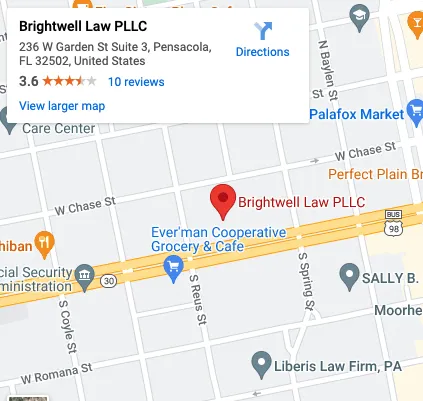Get Legal Assistance For Adoption Process in Pensacola, Florida
The adoption process in Pensacola, Florida is the happiest event in family law of all. Adoptions are about bringing families together as opposed to many other issues, like divorce or child custody disputes, which are about dividing families. Those who wish to begin a new period in their family must ensure they are eligible for the process, that they follow the required procedures, and handle all issues appropriately to walk this new road in the most effective way possible.
Brightwell Law PLLC can help you navigate the criteria for expanding your family through adoption, as we have knowledge in a wide range of family law areas. Given that millions of children need homes every year, adoption can be a wonderful way to give back to the community and offer a child a loving and stable environment to grow.
Our Pensacola, Florida adoption attorney strives to help with these problems. Contact our law office right now to speak with a lawyer.
What is Adoption?
According to general adoption laws, “adoption” refers to the legal procedure by which a court determines the rights and obligations between a child and an adoptive parent in line with state adoption laws.
Adoption also creates a parent-child connection among people who aren’t related biologically. But, there are a few exceptions, such as when a grandparent or other blood relative decides to legally adopt a child as their own.
When a person or couple wishes to have a child but is unable to do so for a number of reasons (such as a health issue), they frequently decide to adopt a non-biological child instead. The prospective adoptive parent(s) and the adopted child benefit significantly from adoption. According to the law, the parent and adopted child are considered family.
What are the Types of Adoption?
In order to bring a child into your life or establish your legal relationship with one, adoption can be used in a number of different ways. The details on the various adoption processes are as follows:
Agency Adoptions
In agency adoptions, a child is placed with adoptive parents by a public agency, or by a private agency licensed or regulated by the state.
Public agencies often place children who have been designated as wards of the state as a result of situations like orphanages, abandonment, or abuse. Private agencies are occasionally managed by charities or social service organizations. Private adoption agencies typically get children from parents who have or are expecting a child they wish to place for adoption.
Independent Adoptions
A private or independent adoption does not involve an agency. In some independent adoptions, the birth parents and adoptive parents reach a decision together on their own. At the same time, in other situations, a third party—such as a lawyer, medical professional, or clergyperson—acts as the intermediary. In the majority of independent adoptions, whether or not there is an intermediary, the adopting parents will normally engage an attorney to manage the court paperwork.
Independent adoptions are regarded as “open” if the birth parents and adoptive parents speak to one another while the child is still in the womb and if the adoptive parents consent to stay in touch with the birth parents after the adoption through letters, photos, or in-person meetings.
Identified Adoptions
When the birth mother and adoptive parents are able to get in touch before asking an adoption agency to handle the remainder of the adoption process, this is known as an identified adoption, also referred to as a designated adoption. This procedure combines independent adoption and agency adoption.
Prospective adoptive parents can skip the agency waiting lists while still utilizing the counseling services and legal knowledge of the agency by independently locating the birth parent. The involvement of an agency might only make everyone more comfortable. Parents in the states that prohibit independent adoptions might choose from the adoptions that have been identified.
International Adoptions
Through international adoption, the new parents take in a child who’s a citizen of another country. The parents must work with US Citizenship and Immigration Services (USCIS) to get an immigrant visa for the child in addition to meeting the adoption requirements of the foreign country and their home state in the US. The child will be automatically granted US citizenship upon arrival.
Stepparent Adoptions
In a stepparent adoption, a parent’s new spouse adopts a child they shared with their ex-spouse. Compared to independent or agency adoption, stepparent adoption is easier. The process is rather simple, especially if the child’s other biological parent approves. If the other birth parent cannot be located or declines to consent to the adoption, there is more documentation to complete and the adoptive parents may need legal assistance.
Same-Sex Adoptions
Married same-sex couples now have more adoption rights than ever, thanks to the legalization of same-sex unions across the nation, including the ability to apply for stepparent adoption in each of the 50 states and second-parent adoption in those that allow it regardless of marital status.
Unfortunately, Florida law specifically prohibits same-sex relationships and same-sex couples from adopting.
Relative (Kinship) Adoptions
In a relative adoption, often referred to as a kinship adoption, a member of the child’s family proposes to adopt. Grandparents frequently adopt children if the parents pass away when they are still young or if the parents are otherwise unable to care for the children. In the majority of states, these adoptions are less complicated than non-relative adoptions. If the adopted child has siblings who weren’t adopted at the same time, kinship adoption procedures often permit communication between the siblings after the adoption.
Adult Adoptions
It is typically permissible for one adult to adopt another as long as there is at least a 10-year age gap and the parties can demonstrate that the adoption is in the best interests of all involved parties as well as the public good. Adult adoptions are typically stepparent adoptions that the family wanted to complete when the younger person was a minor to secure inheritance rights but never got around to.
Sometimes, older adults without children will encounter younger persons they wish to treat as their children in order to get inheritances. Protections are in place in many states which stipulate the regulation of adult adoptions involving elder caregivers in order to prevent elder financial abuse.
What is the Adoption Process in Pensacola, Florida?
The best place to start when thinking about adoption is by learning more about the adoption process in Pensacola, FL.
This is a detailed explanation of Florida’s adoption procedure:
Step 1: Notice:
Before the hearing begins, the adoptive parents must notify everyone legally connected to the child’s life. Depending on the child’s age, you may also need to notify the adoption agency, guardian, biological parents, and adoptive parents. Speak with an adoption lawyer in Pensacola, FL to learn more about the notification requirements in your state.
Step 2: The Adoption Petition
You will work with your adoption agency or attorney to complete the adoption petition. Typically, the petition includes:
- the child, as well as the names, ages, and addresses of the child’s biological parents.
- a statement that the adoptive parents are informed of their obligations and rights
- the reason for removing the legal rights of biological parents
- the relationship between the child and their adoptive parents (such as non-familial or step-parent)
- a statement that the adoptive parents are the best parents, and
- a statement that the adoption is in the child’s best interests.
You must file your petition with a copy of the biological parent’s adoption consent form. If the court involuntarily terminated the parent’s parental rights, a copy of the court order must be given. The majority of the time, the adoptive parents also want the child’s name changed. Include a request for a name change with your adoption petition to accomplish this.
The Last Step: The Hearing
Although the court hearing is primarily merely a formality, it can be a happy and life-changing day for the new family. The judge will question the adoptive parents while they are swearing as to their understanding of the adoption’s implications, including their right to raise an obligation to support the child. If the court decides that the adoption is in the child’s best interests, the judge will sign the adoption order and, if necessary, an order for a name change.
Why Do I Need a Family Law Attorney in Florida?
Adoption is a legal process that requires strict adherence to various laws and regulations. The process can be complex, time-consuming, and emotionally draining, and it’s important to have legal assistance by your side to guide you through it. A family law attorney in Pensacola, FL, can provide valuable assistance during the adoption process by:
- Ensuring Compliance with Florida Adoption Laws: A family law attorney is familiar with the adoption laws in Florida, and they can ensure that you comply with all legal requirements throughout the adoption process. They can also help you understand your legal rights and responsibilities as an adoptive parent.
- Helping You Navigate the Adoption Process: Adoption involves a lot of paperwork, including legal documents, background checks, and home studies. An attorney can help you navigate this paperwork and ensure that everything is submitted correctly and on time.
- Providing Legal Representation: In some cases, the adoption process may involve legal disputes or challenges, such as contested adoptions, termination of parental rights, or challenges to the adoption by biological parents. An attorney can represent you in court and help protect your rights and interests.
- Providing Emotional Support: Adoption is a life-changing event, and it can be emotionally challenging for all parties involved. A family law attorney can provide emotional support and guidance throughout the process, helping you make informed decisions and navigate any challenges that arise.
A family law attorney is an essential resource during the adoption process in Pensacola, FL. They can help ensure that the process goes smoothly and protect your interests and rights as an adoptive parent.
Do not hesitate to call our Florida law firm or get in touch with us through the chatbox located at the lower right of our homepage website.
Call our Florida Adoption Attorney Now!
Even after an adoption is legally finalized, the adoption process in Pensacola, FL, is still not over. The journey will last a lifetime, and it’s just getting started. It is a huge commitment, but raising an adopted child has a lot of benefits.
Sometimes, adoption is the only way to experience the wonder of parenting a child. It’s unfortunate that no two adoptions are the same and that each unique situation may provide its own set of challenges. With your endeavor, The Brightwell Law PLLC is here to support you.
Please get in touch with our law office if you require legal advice on adoption. Contact our knowledgeable adoption lawyer in Pensacola, Florida, right away, and we’ll provide prospective parents with excellent legal assistance!
We also offer Pensacola, Florida the following services aside from Family Law:


